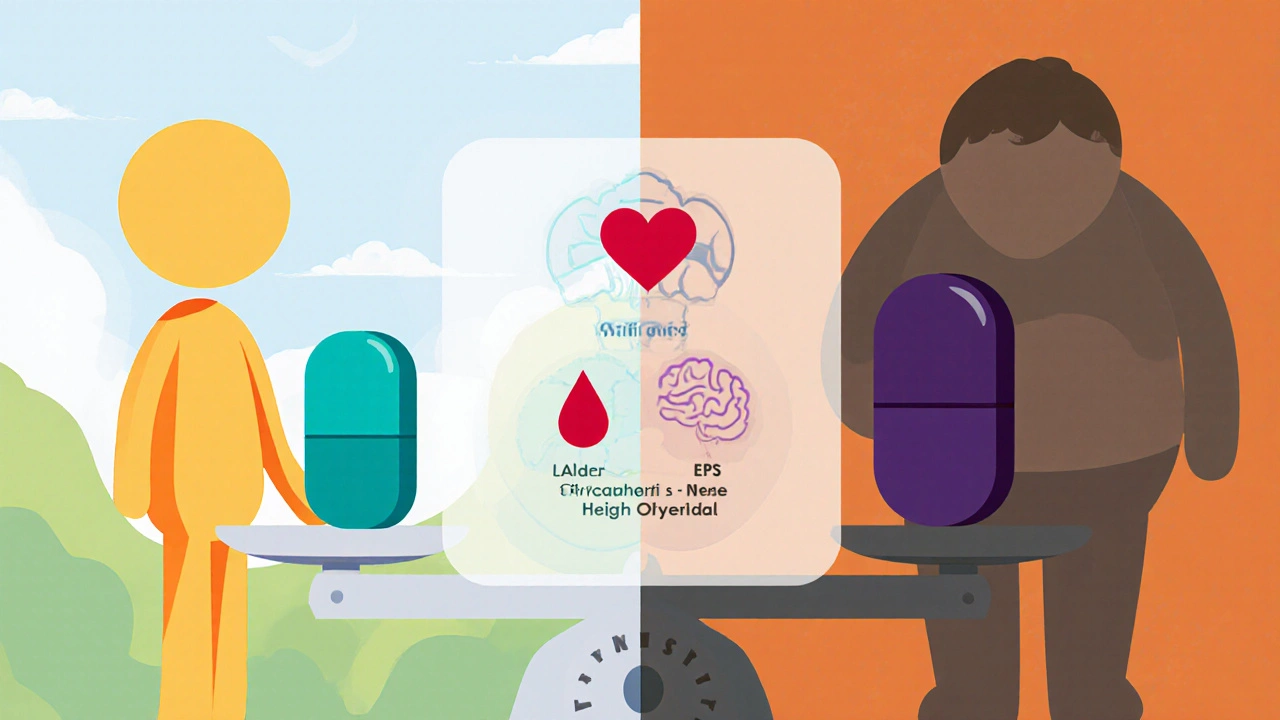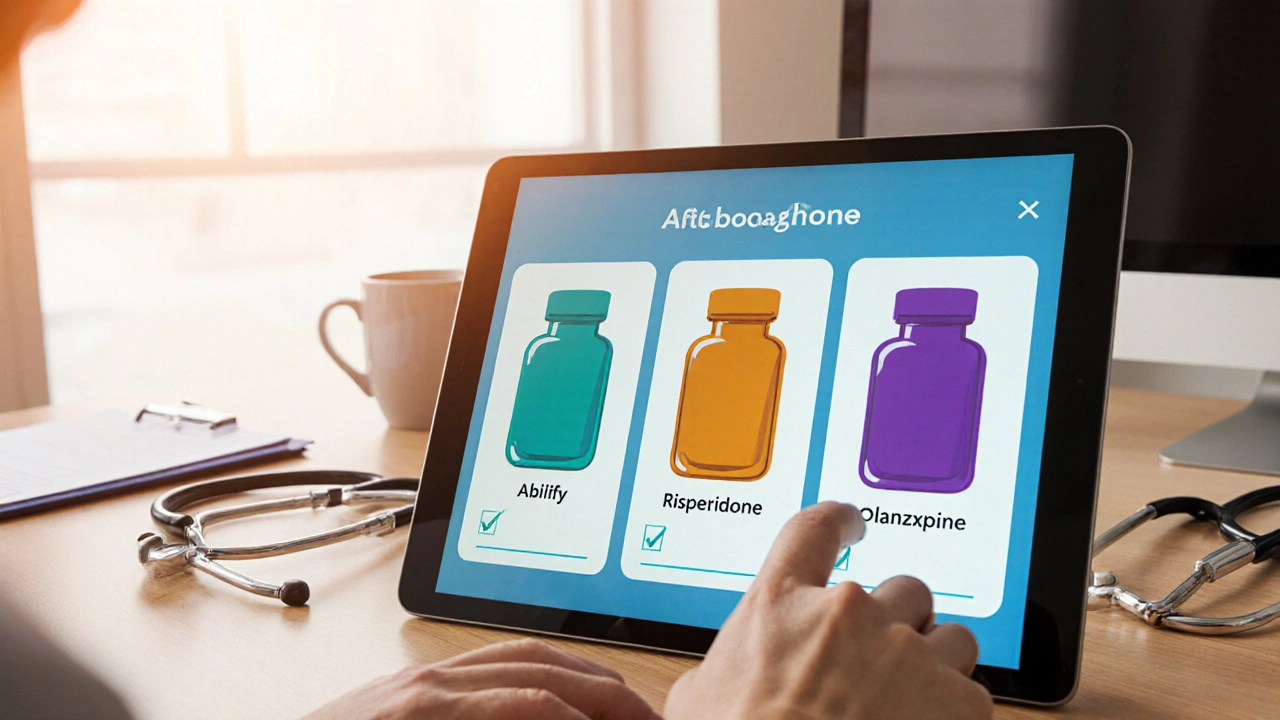Antipsychotic Comparison Tool
Key Insights
- Abilify has a lower risk of weight gain and metabolic issues compared to olanzapine and risperidone.
- Quetiapine is effective for mood stabilization and insomnia but causes significant sedation.
- Olanzapine provides strong efficacy for acute psychosis but carries the highest risk of weight gain and metabolic syndrome.
- Ziprasidone and Lurasidone have low weight gain profiles but require fatty meals for absorption.
When it comes to treating schizophrenia, bipolar disorder, or major depressive episodes, Abilify is often mentioned alongside a host of other antipsychotics. Understanding how it stacks up against the competition helps patients, families, and clinicians pick the right drug for a specific situation.
Quick Takeaways
- Abilify (aripiprazole) is a partial dopamine agonist, giving it a lower risk of weight gain and metabolic issues.
- Risperidone and olanzapine are more potent dopamine blockers, which can be better for acute psychosis but raise sedation and weight concerns.
- Quetiapine shines for sleep‑disturbance and anxiety, but its dose‑dependent sedation can limit daytime functioning.
- Ziprasidone and lurasidone offer low‑weight‑gain profiles, yet they require meals with sufficient fat for proper absorption.
- Cost varies widely in the UK - Abilify is often cheaper on the NHS for adults, while newer agents may need private funding.
How Abilify Works and Who Uses It
Abilify is a second‑generation (atypical) antipsychotic classified as a dopamine‑serotonin system stabilizer. It binds to D2 receptors as a partial agonist, meaning it can both stimulate and block dopamine depending on the brain’s existing levels. This unique action tends to balance dopamine activity rather than shutting it down completely, which explains its milder side‑effect profile for many users.
Approved by the FDA in 2002 and by the UK MHRA shortly after, Abilify is indicated for:
- Schizophrenia (adults and adolescents)
- Bipolar I disorder (mania, maintenance)
- Adjunct treatment for major depressive disorder
- Irritability associated with autistic disorder
Typical oral doses range from 10mg to 30mg daily, with a long‑acting injectable (Abilify Maintena) available for patients who need adherence support.
Key Criteria for Comparing Antipsychotics
When you line up Abilify against its peers, focus on the factors that matter most in real‑world use:
- Efficacy for core symptoms - how well does the drug reduce hallucinations, delusions, mood swings?
- Side‑effect profile - weight gain, metabolic syndrome, sedation, extrapyramidal symptoms (EPS), prolactin elevation.
- Dosing flexibility - once‑daily tablets, liquids, or long‑acting injections.
- Drug‑drug interactions - CYP450 metabolism, need for food, QT‑interval concerns.
- Cost and NHS availability - brand‑name vs generic, eligibility for prescription exemption.
Using these criteria, let’s see how the most common alternatives compare.
Direct Comparison Table
| Drug | Mechanism | Typical Daily Dose (mg) | Efficacy (acute psychosis) | Weight / Metabolic Risk | EPS / Prolactin | Special Considerations |
|---|---|---|---|---|---|---|
| Abilify | Partial D2 agonist, 5‑HT1A agonist | 10-30 | Comparable to risperidone in trials | Low (average +1kg) | Low EPS, minimal prolactin rise | Injectable option; needs caution with CYP2D6 inhibitors |
| Risperidone | D2/D3 antagonist, 5‑HT2A antagonist | 2-8 | High - gold standard for acute psychosis | Moderate (average +3kg) | Moderate EPS, notable prolactin increase | Oral and depot (Risperdal Consta) available; may cause hyperprolactinemia |
| Quetiapine | Low‑affinity D2 antagonist, strong H1 antihistamine | 150-800 | Effective for psychosis, excellent for mood stabilization | Low‑moderate (average +2kg) | Low EPS, high sedation | Often used off‑label for insomnia; dose‑dependent drowsiness |
| Olanzapine | Strong D2 and 5‑HT2A antagonist | 5-20 | Very high - rapid symptom control | High (average +7kg, metabolic syndrome risk) | Low EPS, but high weight/metabolic issues | Available as combination with fluoxetine (Symbyax) for depression |
| Ziprasidone | D2/D3 antagonist, 5‑HT1A partial agonist | 40-80 | Good efficacy, similar to risperidone | Low weight gain | Low EPS, QT‑c prolongation risk | Must be taken with a meal containing ≥30g fat |
| Lurasidone | D2 antagonist, 5‑HT2A/7 antagonist | 20-120 | Effective for schizophrenia and bipolar depression | Very low weight gain | Low EPS, minimal metabolic impact | Also requires a fatty meal; limited availability in some UK pharmacies |

When Abilify Is a Good Fit
If you’re looking for a drug that balances efficacy with a milder metabolic footprint, Abilify often tops the list. It’s especially appealing when:
- You’ve struggled with weight gain on olanzapine or clozapine.
- Prolactin‑related side effects (like menstrual changes) have been an issue on risperidone.
- Adherence is a concern - the once‑monthly injection can keep levels steady.
- You need a medication that can also augment antidepressants for major depressive disorder.
That said, Abilify’s partial agonism may not quell the most severe psychotic bursts as quickly as a full antagonist like risperidone. In emergency hospitalization settings, clinicians sometimes start with a high‑potency agent and then switch to Abilify for maintenance.
Strengths and Drawbacks of Common Alternatives
Risperidone offers rapid control of hallucinations but raises prolactin, which can lead to sexual dysfunction or bone density loss in long‑term use. Its depot form is handy for patients who miss pills, yet the injection site can be painful.
Quetiapine is a favorite for people who also battle anxiety or insomnia because of its sedative qualities. However, the need for high daily doses (often >300mg) can increase the pill burden.
Olanzapine is a powerhouse for acute crisis, but the weight‑gain potential is a serious deterrent, especially for younger patients with diabetes risk.
Ziprasidone shines for low‑weight‑gain goals, but the mandatory fatty meal rule trips up many adherent patients. Its QT‑c effect also means regular ECG monitoring for people with cardiac history.
Lurasidone combines low metabolic impact with solid efficacy for bipolar depression, yet its requirement for a high‑fat meal and limited NHS formulary placement can make access tricky.
Cost, NHS Availability, and Private Options in the UK
Abilify’s generic (aripiprazole) is listed on the NHS Drug Tariff, typically costing around £0.30 per tablet for adults. Risperidone and quetiapine are also generic and similarly priced. Olanzapine, while cheap as a generic, may be prescribed less often due to its side‑effect profile.
Ziprasidone and lurasidone are newer and often fall under PartIII of the NHS prescription charge, meaning patients may need to pay the standard £9.35 per item unless they qualify for exemption. Private prescriptions can push the price up to £2-£4 per tablet.
For long‑acting injections, the NHS covers the cost, but the administration fee might be billed separately in some clinics. Always ask your pharmacist about any potential dispensing fees.
Safety Tips & Managing Side Effects
Regardless of the drug you choose, regular monitoring is essential:
- Weight, waist circumference, fasting glucose, and lipid panel every 3months for the first year.
- Blood pressure and pulse - antipsychotics can cause orthostatic changes.
- EPS assessment: Look for tremor, rigidity, or slowed movements; consider anticholinergic add‑on if needed.
- Prolactin level if menstrual irregularities or galactorrhea appear.
- ECG for ziprasidone and any drug with known QT‑c impact.
If weight gain starts creeping up, a simple diet tweak (reduce sugary drinks, add walking) can offset the average 1-2kg gain seen with Abilify. For more stubborn metabolic shifts, switching to a lower‑risk agent like lurasidone may be warranted.
Decision Checklist for Patients & Caregivers
- Identify the primary treatment goal: acute psychosis control vs maintenance vs mood stabilization.
- Rate the importance of weight/metabolic health on a scale of 1-5.
- Check for any existing cardiac or endocrine conditions that could limit certain drugs.
- Consider adherence: do you prefer daily tablets or a monthly injection?
- Review NHS formulary: is the chosen drug listed, or will you need a private prescription?
- Discuss with your psychiatrist the possibility of a trial period (4-6weeks) to gauge effectiveness.
- Plan follow‑up labs and appointments before starting the medication.
Following this checklist can turn a confusing prescription decision into a clear, personalized plan.

Frequently Asked Questions
Can Abilify cause weight loss?
Weight loss is uncommon, but some people experience stable weight or even a small loss, especially compared with heavier agents like olanzapine. Any change should be monitored with routine weight checks.
Is the Abilify injection safe for older adults?
Yes, the long‑acting injectable is approved for adults of all ages. Older patients may need dose adjustments if they have liver or kidney impairment, and the injection site should be inspected for bruising.
How does Abilify interact with antidepressants?
Abilify is often added to SSRIs or SNRIs for treatment‑resistant depression. The main interaction risk is with CYP2D6 inhibitors (like fluoxetine), which can raise aripiprazole levels. Dose reduction may be needed.
Why does ziprasidone need a fatty meal?
Ziprasidone’s absorption is highly lipophilic; a meal containing at least 30g of fat boosts its bioavailability from ~30% to >80%. Skipping the meal can lead to sub‑therapeutic levels.
What should I do if I experience severe sedation on quetiapine?
Talk to your prescriber about lowering the dose or switching to a less sedating alternative like lurasidone. Sometimes splitting the dose (morning + night) reduces daytime drowsiness.


Tara Phillips
For anyone weighing the options, consider that aripiprazole’s partial agonist profile often translates into a gentler metabolic footprint, which can be a decisive factor for long‑term adherence. The drug’s flexibility-available in oral tablets, a once‑monthly injection, and even a pediatric formulation-means clinicians can tailor the regimen to the patient’s lifestyle. Moreover, the relatively low incidence of prolactin elevation reduces the risk of endocrine side‑effects that complicate treatment courses. In practice, these attributes combine to make Abilify a compelling first‑line choice for many clinicians seeking a balance between efficacy and tolerability.